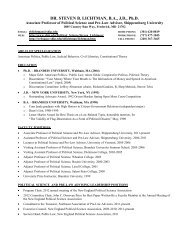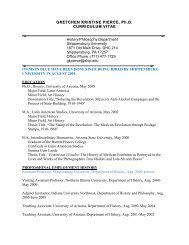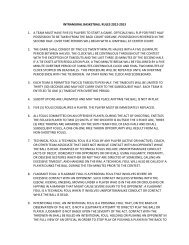Complete Issue - Shippensburg University
Complete Issue - Shippensburg University
Complete Issue - Shippensburg University
- No tags were found...
You also want an ePaper? Increase the reach of your titles
YUMPU automatically turns print PDFs into web optimized ePapers that Google loves.
30 PROTEUS: A Journal of Ideas• the identities that individuals intentionallycreate through their own behaviour andinternalisation of norms (reputation).Trust, reciprocity, and reputation are relationshipconstructions that fill a gap of indeterminateness of theobjective social foundation (Cella 1994). According toOstrom (1998) the existence of a mutual reinforcementamong these variables, considered to be at the core ofthe general behavioural explanation, can be dynamicallyillustrated as follows:Source: Ostrom (1998)Reputation, trust, and reciprocity act througha positive retroaction circle. Therefore, it seemsimpossible to individualize them among dependentand independent elements. Every variation on a singlevariable strikes again into the chain on the others,amplifying the initial effect, that could be both positiveand negative.The reinforcement among these individual attributesdepends on structural variables, such as existence ofsmall communities, their past experiences, possibilitiesfor a direct communication, and the existence ofsymmetrical affairs on the resource. All such factorsengrave on the cost of internal and social agreements,from which it derives the cooperation level, initiallyreached through individuals’ ability to set asideselfishness.Jon Elster’s contribution provides support ofthis perspective (1993, 1995). He analyzes altruisticmotivations by identifying different actors’ groupsaccording to different levels of propensity tocooperation. The group that appears to be morerelevant in terms of accomplishing communal argumentis formed by those people who act according to thecategorical imperative of Kant, that answers to thefollowing question: “What happens if all of us wouldact so?” This powerful person’s appeal does not dealwith the real results or private purposes because it isconnected to what could be verified if everyone abstainsfrom the cooperation. Such motivation would forbidthe egoistic behaviour, bringing the community exactlyto an opposite outcome respect to the utilitarianism.For this reason, these results could be extremelyimportant for understanding individual contributions inmatters of commons management.Rationality and valuesSince informal ties are broadly diffused as astructural base for social relationships, the self-interestpoint of view does not occupy a core position in thecurrent relational environment. According to Hirsch(1976), the main question is not concerned withwhether individuals are sociable or altruistic in theirobjectives, but rather is focused on the possibilitiesof realizing the prevailing objectives of sociality andaltruism in the community. For the author, constraintsof the scarcity and demands of social moralityconstitute the two social limits to growth. For thiswork, they can be helpfully interpreted as consequentialbonds derived from the missed solution of the socialaction dilemmas, like the ones we observe in governingcommon pool resources and as a consequence inwater management. Limitation to individual selfishbehaviour, imposed in the collective interest, could bemore effectively respected if the sense of obligationwould come interiorized. Already in the mid 1970s,Hirsch made emerge an interpretative urgency for thegenerality of the goods that will then be developed byOstrom for common pool resources in the mid 1980s:“The public perception of society’s costs in itscomplex will contribute to encourage the socialmorality, but it will not be enough to assure it untilthe individualistic behaviour will preserve its ownlegitimacy in comparison to the broad sphere ofthe collective action. Once more, the individualisticbehaviour can be an obstacle to the satisfaction of theindividual preference”. (Hirsch 1976)Such overcoming, if it points out a predispositionto shared collective beliefs and to be open to acomprehensive vision of cooperative ethic (Sugden1986), does not require the abandonment of rationality.In fact, according to the sociological tradition (Boudon1997, 2000, 2003), actions which are apparentlynot referable to some consequential explanation noranalyzable as effects of instrumental reasons, do nothave to be viewed as completely detached from everyrational logic. In these cases, actors follow principlesfounded upon reasons to which they simply feel obligedto conform to. This is the case of a collective beliefgenesis, whose content becomes an object of voluntaryadhesion by the individuals. Boudon referred to hiswork as an axiological perspective and quoted Weber’svalue rationality (Wertrationalität) as a fundamentalcontribution to contemporary studies focused onmoral feelings. For the present research, what is moreinteresting is distinguishing between the axiologicalrationality and the instrumental one of economic kind.In this manner, one of the limits of the utilitarianmodel emerges with greater clarity: not knowing howto explain attribution of values phenomena. Instead,axiological rationality expressly foresees cases in whichthe subject does not choose to maximize immediatebenefits, but chooses to follow “correct” principles notguided by personal will.
















